China's Jilin produces World's largest ginseng output
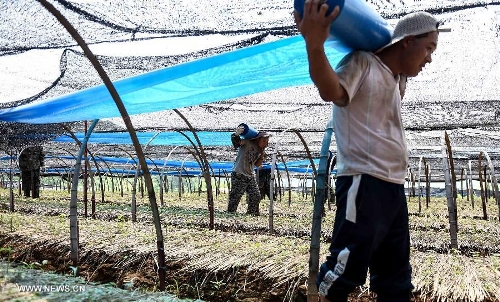
Villagers work in a ginseng plantation at Yulin Village in Ji'an, northeast China's Jilin Province, June 11, 2015. China has a long history of cultivating ginseng, which is considered to be nutritious and to have medicinal value in traditional Chinese medicine. Considered as the world's largest ginseng production area, Jilin produces about 85 percent of China's total ginseng output and 70 percent of the world's output. More than 98 percent of ginseng in Jilin is currently cultivated, not grown in the wild. (Xinhua/Wang Haofei)
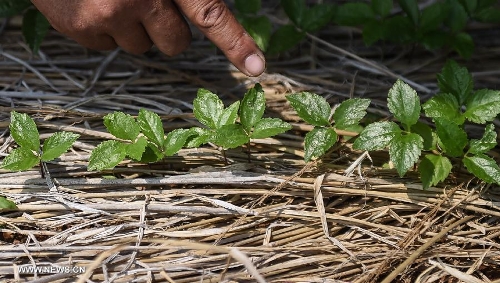
A villager takes care of ginseng seedlings at Yulin Village in Ji'an, northeast China's Jilin Province, June 11, 2015. China has a long history of cultivating ginseng, which is considered to be nutritious and to have medicinal value in traditional Chinese medicine. Considered as the world's largest ginseng production area, Jilin produces about 85 percent of China's total ginseng output and 70 percent of the world's output. More than 98 percent of ginseng in Jilin is currently cultivated, not grown in the wild. (Xinhua/Wang Haofei)
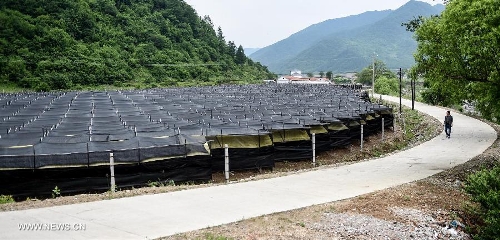
Lin Chengri, a villager, walks past his ginseng plantation at Shuangcha Village in Ji'an, northeast China's Jilin Province, June 11, 2015. China has a long history of cultivating ginseng, which is considered to be nutritious and to have medicinal value in traditional Chinese medicine. Considered as the world's largest ginseng production area, Jilin produces about 85 percent of China's total ginseng output and 70 percent of the world's output. More than 98 percent of ginseng in Jilin is currently cultivated, not grown in the wild. (Xinhua/Wang Haofei)
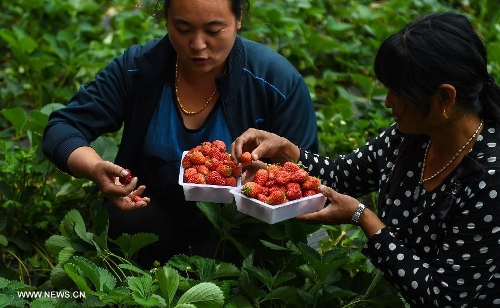
Villagers harvest strawberries fertilized with residual ginseng leaves at Shanghuolong Village in Ji'an, northeast China's Jilin Province, June 11, 2015. China has a long history of cultivating ginseng, which is considered to be nutritious and to have medicinal value in traditional Chinese medicine. Considered as the world's largest ginseng production area, Jilin produces about 85 percent of China's total ginseng output and 70 percent of the world's output. More than 98 percent of ginseng in Jilin is currently cultivated, not grown in the wild. (Xinhua/Wang Haofei)
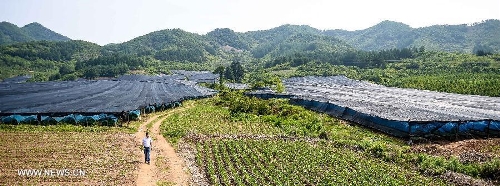
Zhu Guilin, a villager, walks past his ginseng plantation at Yulin Village in Ji'an, northeast China's Jilin Province, June 11, 2015. China has a long history of cultivating ginseng, which is considered to be nutritious and to have medicinal value in traditional Chinese medicine. Considered as the world's largest ginseng production area, Jilin produces about 85 percent of China's total ginseng output and 70 percent of the world's output. More than 98 percent of ginseng in Jilin is currently cultivated, not grown in the wild. (Xinhua/Wang Haofei)
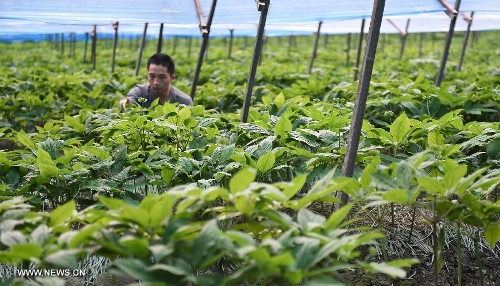
Lin Chengri, a villager, takes care of ginsengs at Shuangcha Village in Ji'an, northeast China's Jilin Province, June 11, 2015. China has a long history of cultivating ginseng, which is considered to be nutritious and to have medicinal value in traditional Chinese medicine. Considered as the world's largest ginseng production area, Jilin produces about 85 percent of China's total ginseng output and 70 percent of the world's output. More than 98 percent of ginseng in Jilin is currently cultivated, not grown in the wild. (Xinhua/Wang Haofei)
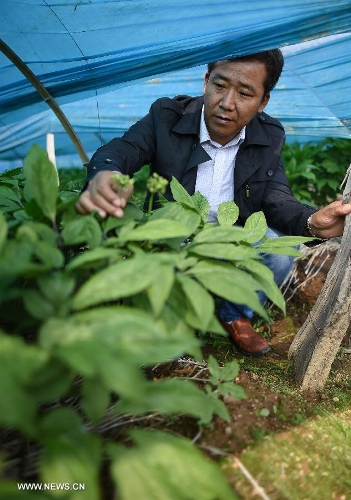
Zhu Guilin, a villager, takes care of ginsengs at Yulin Village in Ji'an, northeast China's Jilin Province, June 11, 2015. China has a long history of cultivating ginseng, which is considered to be nutritious and to have medicinal value in traditional Chinese medicine. Considered as the world's largest ginseng production area, Jilin produces about 85 percent of China's total ginseng output and 70 percent of the world's output. More than 98 percent of ginseng in Jilin is currently cultivated, not grown in the wild. (Xinhua/Wang Haofei)
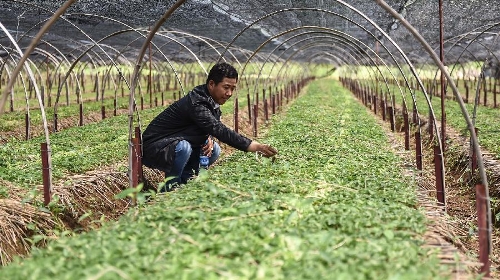
Zhu Guilin, a villager, weeds at his ginseng plantation at Yulin Village in Ji'an, northeast China's Jilin Province, June 11, 2015. China has a long history of cultivating ginseng, which is considered to be nutritious and to have medicinal value in traditional Chinese medicine. Considered as the world's largest ginseng production area, Jilin produces about 85 percent of China's total ginseng output and 70 percent of the world's output. More than 98 percent of ginseng in Jilin is currently cultivated, not grown in the wild. (Xinhua/Wang Haofei)
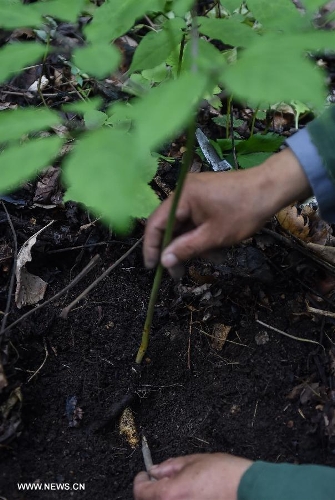
Wang Benjie, a villager, shows woods-grown ginsengs at Shihu Village in Ji'an, northeast China's Jilin Province, June 10, 2015. China has a long history of cultivating ginseng, which is considered to be nutritious and to have medicinal value in traditional Chinese medicine. Considered as the world's largest ginseng production area, Jilin produces about 85 percent of China's total ginseng output and 70 percent of the world's output. More than 98 percent of ginseng in Jilin is currently cultivated, not grown in the wild. (Xinhua/Wang Haofei)
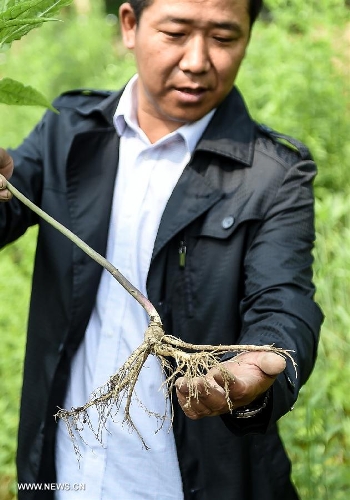
Zhu Guilin, a villager, looks over a ginseng at Yulin Village in Ji'an, northeast China's Jilin Province, June 11, 2015. China has a long history of cultivating ginseng, which is considered to be nutritious and to have medicinal value in traditional Chinese medicine. Considered as the world's largest ginseng production area, Jilin produces about 85 percent of China's total ginseng output and 70 percent of the world's output. More than 98 percent of ginseng in Jilin is currently cultivated, not grown in the wild. (Xinhua/Wang Haofei)
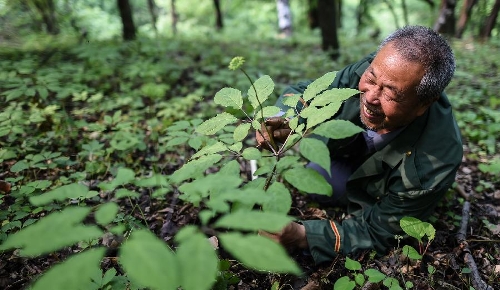
Wang Benjie, a 68-year-old villager, looks over his woods-grown ginsengs at Shihu Village in Ji'an, northeast China's Jilin Province, June 10, 2015. China has a long history of cultivating ginseng, which is considered to be nutritious and to have medicinal value in traditional Chinese medicine. Considered as the world's largest ginseng production area, Jilin produces about 85 percent of China's total ginseng output and 70 percent of the world's output. More than 98 percent of ginseng in Jilin is currently cultivated, not grown in the wild. (Xinhua/Wang Haofei)
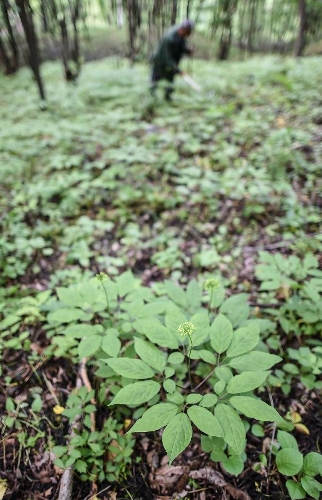
Wang Benjie, a villager, takes care of his woods-grown ginsengs at Shihu Village in Ji'an, northeast China's Jilin Province, June 10, 2015. China has a long history of cultivating ginseng, which is considered to be nutritious and to have medicinal value in traditional Chinese medicine. Considered as the world's largest ginseng production area, Jilin produces about 85 percent of China's total ginseng output and 70 percent of the world's output. More than 98 percent of ginseng in Jilin is currently cultivated, not grown in the wild. (Xinhua/Wang Haofei)
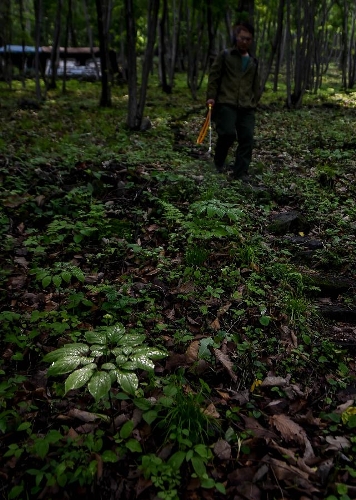
A villager takes care of his woods-grown ginsengs at Qiupi Village in Ji'an, northeast China's Jilin Province, June 10, 2015. China has a long history of cultivating ginseng, which is considered to be nutritious and to have medicinal value in traditional Chinese medicine. Considered as the world's largest ginseng production area, Jilin produces about 85 percent of China's total ginseng output and 70 percent of the world's output. More than 98 percent of ginseng in Jilin is currently cultivated, not grown in the wild. (Xinhua/Wang Haofei)
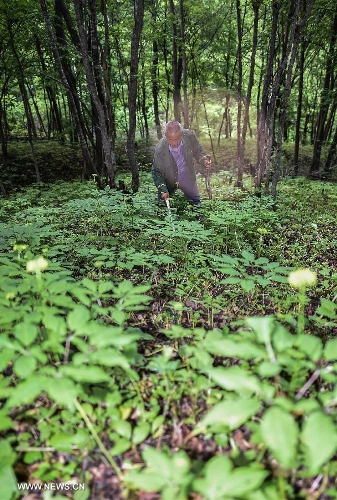
Wang Benjie, a villager, takes care of his woods-grown ginsengs at Shihu Village in Ji'an, northeast China's Jilin Province, June 10, 2015. China has a long history of cultivating ginseng, which is considered to be nutritious and to have medicinal value in traditional Chinese medicine. Considered as the world's largest ginseng production area, Jilin produces about 85 percent of China's total ginseng output and 70 percent of the world's output. More than 98 percent of ginseng in Jilin is currently cultivated, not grown in the wild. (Xinhua/Wang Haofei)
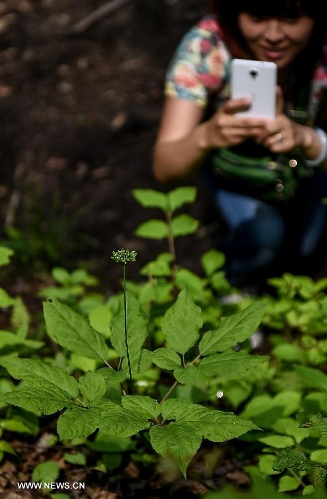
A visitor takes photos of woods-grown ginsengs at Qiupi Village in Ji'an, northeast China's Jilin Province, June 10, 2015. China has a long history of cultivating ginseng, which is considered to be nutritious and to have medicinal value in traditional Chinese medicine. Considered as the world's largest ginseng production area, Jilin produces about 85 percent of China's total ginseng output and 70 percent of the world's output. More than 98 percent of ginseng in Jilin is currently cultivated, not grown in the wild. (Xinhua/Wang Haofei)
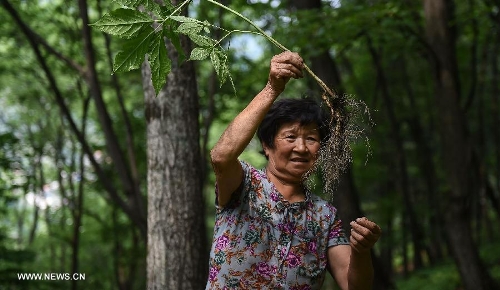
A villager looks over woods-grown ginsengs at Qiupi Village in Ji'an, northeast China's Jilin Province, June 10, 2015. China has a long history of cultivating ginseng, which is considered to be nutritious and to have medicinal value in traditional Chinese medicine. Considered as the world's largest ginseng production area, Jilin produces about 85 percent of China's total ginseng output and 70 percent of the world's output. More than 98 percent of ginseng in Jilin is currently cultivated, not grown in the wild. (Xinhua/Wang Haofei)
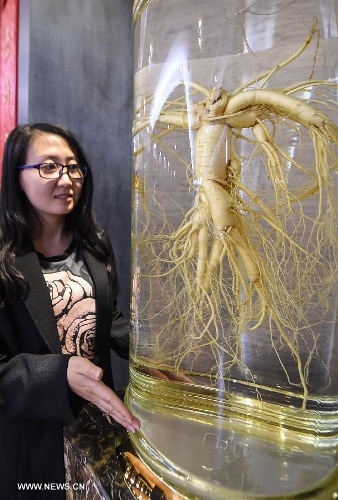
A fine sample of ginseng is displayed at a ginseng processing plant in Ji'an, northeast China's Jilin Province, June 11, 2015. China has a long history of cultivating ginseng, which is considered to be nutritious and to have medicinal value in traditional Chinese medicine. Considered as the world's largest ginseng production area, Jilin produces about 85 percent of China's total ginseng output and 70 percent of the world's output. More than 98 percent of ginseng in Jilin is currently cultivated, not grown in the wild. (Xinhua/Wang Haofei)
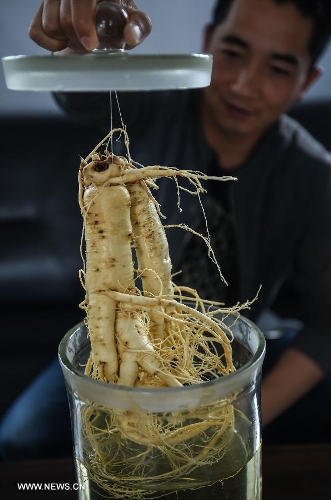
Lin Chengri, a villager growing ginseng, displays a liquor-saturated ginseng at Shuangcha Village in Ji'an, northeast China's Jilin Province, June 11, 2015. China has a long history of cultivating ginseng, which is considered to be nutritious and to have medicinal value in traditional Chinese medicine. Considered as the world's largest ginseng production area, Jilin produces about 85 percent of China's total ginseng output and 70 percent of the world's output. More than 98 percent of ginseng in Jilin is currently cultivated, not grown in the wild. (Xinhua/Wang Haofei)
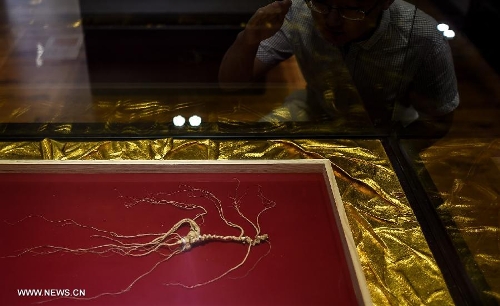
A wild ginseng is displayed at a ginseng processing plant in Ji'an, northeast China's Jilin Province, June 11, 2015. China has a long history of cultivating ginseng, which is considered to be nutritious and to have medicinal value in traditional Chinese medicine. Considered as the world's largest ginseng production area, Jilin produces about 85 percent of China's total ginseng output and 70 percent of the world's output. More than 98 percent of ginseng in Jilin is currently cultivated, not grown in the wild. (Xinhua/Wang Haofei)
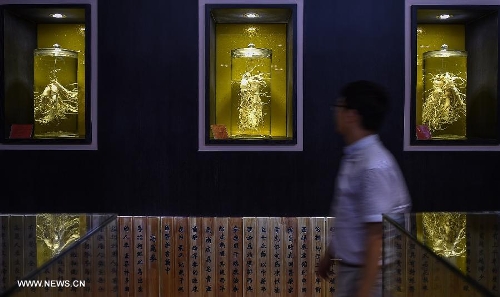
Fine samples of ginseng are displayed at a ginseng processing plant in Ji'an, northeast China's Jilin Province, June 11, 2015. China has a long history of cultivating ginseng, which is considered to be nutritious and to have medicinal value in traditional Chinese medicine. Considered as the world's largest ginseng production area, Jilin produces about 85 percent of China's total ginseng output and 70 percent of the world's output. More than 98 percent of ginseng in Jilin is currently cultivated, not grown in the wild. (Xinhua/Wang Haofei)